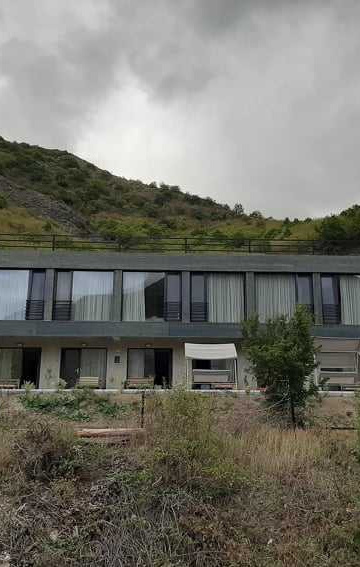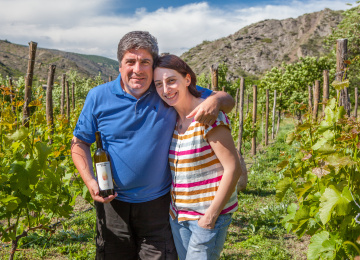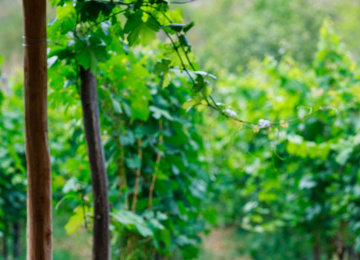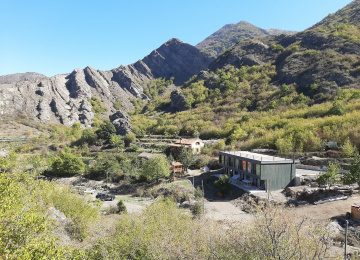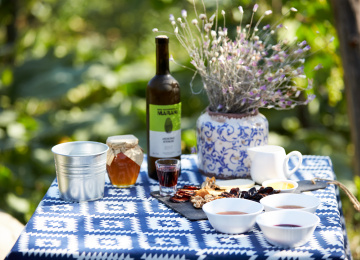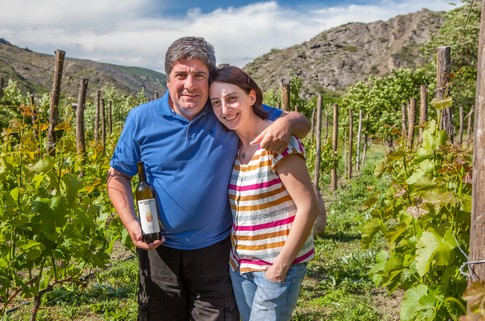
This story begins more than eight years ago with the tasting of a single glass of traditional wine at a family wine cellar in the village of Ateni, Georgia. Beautiful volcanic and forest views, high-quality wine and exceptional local hospitality were what convinced Diana Bolotashvili and her husband Nika Vacheishvili to take a very important step in their journey: they decided to stay in Ateni for good.
The couple built themselves a hotel there, that they called Nika Vacheishvili’s Marani and Guesthouse, “marani” meaning wine cellar in Georgian. In 2018, with support from the EU4Business Initiative, they set up a 13-room hotel in just over three months.
A dream comes true
Located in central Georgia, Ateni is rich with nature and cultural heritage. Volcanic cliffs and wide fields create a harmony with the forests and vineyards of the Ateni Valley, resulting in a natural diversity that is unique to this region. For centuries, the valley has accumulated many historical artefacts, such as architecture and wall paintings at Ateni monastery, Georgian and other lapidary inscriptions, and entire chains of castles. The value and potential of this area are what encouraged Diana Bolotashvili and her husband to start not only a business, but built their dream home here.
Nika Vacheishvili’s Marani and Guesthouse started as a 6-room guesthouse on top of a wine cellar that quickly became popular among visitors to the region. Guests began to come and bring friends and family to fully enjoy all that the valley has to offer. Soon the hotel faced in a critical junction: sales were beyond its infrastructural capacities and the couple realized that they could not host so many guests. In 2018, the family decided that it was time for risk and expansion and moving forward. Luckily, they were able to get a loan tailored to their needs through EU4Business and the EIB Group. Thanks to an EIB Group credit guarantee supported by the EU, they received a loan at more attractive terms and conditions, that made them take the step to expand their business.
“The EU helped us to solve our problem,” explains Diana Bolotashvili. “In a very short time, we had a modern, fully-equipped hotel that was ready for more guests.”
The following year, the hotel had hosted more than 3,000 guests from all over the world—Germany, Austria, Ukraine, Belgium, the US, and even Australia. Their guests gave them a 9.7 rating at Booking.com for exceptional service and unique experiences. Then the pandemic hit, and the hotel did what many other businesses around the globe had to do: it closed down.
“The pandemic hit us hard,” admits Bolotashvili. “We were closed for over a year. Only in 2021 were we able to host some guests and so the hotel started living again.”
To ease the financial stresses of the pandemic, the family started to make and sell goat cheese, jams, compotes and honey, in addition to the delicious wines that they had been making for years.
Royal wine
The hotel’s purpose is to preserve and develop centuries-old agricultural and cultural traditions of the Ateni region, including wine. The family cooperates with the Ateni and Skra Gorges traditional winemaking centre and produces several traditional types of natural wines from the small crops of high-quality grapes its vineyards provide.
In fact, traditional local wine is the main product of the hotel. Atenuri Wine is named after the famous local terroir. Various small vineyards offer a great variety of Atenian wines that are of high quality and exclusive to the region. Altogether, Vacheishvili’s wine cellar makes over 4,000 bottles of wine annually and it’s very popular among hotel guests. Diana Bolotashvili notes that the family hosts small groups of tourists for wine tasting events. The visitors liked the product so much that their word-of-mouth raised the wines profile without advertising.
“We often joke that our wine does not fly to foreign countries, rather foreigners fly here to taste it,” says Diana Bolotashvili.
Atenian wine has been called the “Wine of the Kings” and indeed royal hills and vineyards were once cultivated here, using complicated irrigation, terraces, cellars and more. Nika Vacheishvili’s Marani and Guesthouse continues to be busy producing wine and hosting guests. They are just one of many families that have benefited from the support of EU4Business and the EIB.
“When you love your work and plan accordingly nothing is impossible,” says Bolotashvili.
Indeed, Nika Vacheishvili’s Marani and Guesthouse was among the finalists in the 2021 TBC Business Awards for playing a “special role in the development of the region.” Diana Bolotashvili and Nika Vacheishvili have created local jobs, introduced Georgian nature, history and traditions to hundreds of foreigners, and helped people fell in love with Atenian wines.
But the family is not resting on its laurels: they have big plans not only for the hotel, but for the region as a whole. They have already organized different hiking routes that are quite popular among visitors. And they plan to add biking and horseback riding routes, as the area has plenty of potential to develop more diverse activities. They also want to finish building an arts space that can be used for a variety of events, such as exhibits, mini-festivals, writers’ marathons, and so on. Such events are especially meaningful in a place like Ateni, which is home to so many historic and cultural artefacts that merit preservation.
The EU4Business initiative and the EIB Group work together with local banks to provide more opportunities for SMEs in Georgia. The EIB has worked in Georgia since 2007 to support economic and social development. It has invested in more than 23 projects in infrastructure, the private sector and climate action. Under the EU4Business umbrella, the EIB Group offers credit lines to address the scarcity of long-term funding for SMEs in Georgia, portfolio guarantees to de-risk and overcome information asymmetry between banks and SMEs, and technical assistance. Financial partners benefit from funding made available by the EIB on favourable terms. It also provides direct investment loans to Georgian businesses to strengthen the labour market and promote employment.

